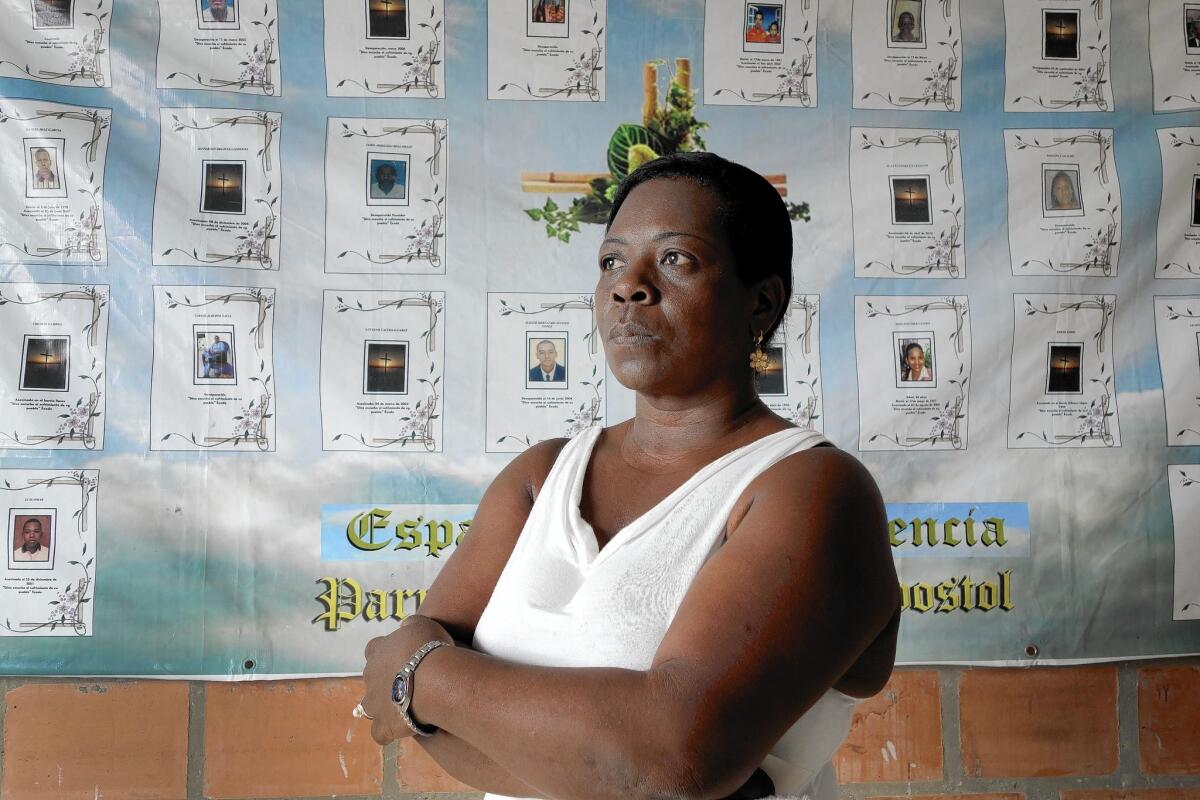In Colombian city, aid group seeks to give displaced women new wings

- Share via
Reporting from Buenaventura, Colombia — Mery Medina has taken on a role in this hyper-violent port city that the Colombian government has been unable to fill: sheltering and counseling women threatened with forced displacement.
There is no shortage of women needing help from Medina and her group, called Butterflies With New Wings. Colombia has one of the world’s largest forcibly displaced populations: people ordered by paramilitaries, rebel groups or criminal bands to leave their homes under threat of violence from fighting, land grabs or drug trafficking.
Among big cities, Buenaventura is the leading sender of such internally displaced people. Last year, 5% of the port city’s population of 370,000 was forced to flee for their lives, according to Human Rights Watch.
The violence is often the result of bloody turf wars fought by rival criminal gangs and the leftist Revolutionary Armed Forces of Colombia, or FARC, for control of drug trafficking in this city, a major Pacific coast staging area for cocaine shipments to North America.
If that weren’t enough, Buenaventura is also among the Colombian cities most beset by sexual violence. Last year 30 women were slain here in cases linked to sex abuse or other sexual violence, and so far this year, 17 have been killed, Medina said. She believes it’s because of a macho culture in this predominantly Afro-Colombian city where abandonment often results in women being the heads of households.
“There is violence for many reasons,” the soft-spoken Medina said in an interview at a church annex that the group uses as its headquarters. “In addition to drug traffickers, we have criminal gangs trying to amass land by force. So, we have to be careful and discreet about what we do.”
The Butterflies group offers threatened women short-term shelter, psychological counseling and vocational training to enable them to stay in their hometown. The group receives funding from several foreign human rights groups and international aid organizations, including USAID.
Fearing vengeful armed groups, Medina and her co-leaders, Gloria Amparo and Maritza Asprilla, try to maintain a low profile. Yet word of their courageous work has filtered out. This month, the Office of the United Nations High Commissioner for Refugees named the group the recipient of the Nansen Refugee Award, the highest honor given in their line of human rights work.
In announcing the award, U.N. High Commissioner for Refugees Antonio Guterres cited Butterflies With New Wings for helping 1,000 women and their families: “Every day they try to heal the wounds of the women and children of Buenaventura, putting their own lives at risk.”
The aid rendered by Medina’s group and others underscores the need for private social welfare agencies in a country where many areas remain lawless, despite economic growth and reductions in poverty and cocaine production.
Poor residents remain vulnerable in a country where a weak state presence means community groups must take care of their own, said Luis Antonio Benavides Zapata, director of the Port District Foundation, a charitable organization that backs cultural and vocational education.
“Resources are inferior to the need here,” Benavides Zapata said. “Another problem is that we lack spokespeople who will fight for the region. So we lack credibility.”
One gang fighting for dominance in the port is the notorious Urabeños criminal group, which routinely wages bloody battles with competitors to control shanty neighborhoods and the latticework of inlets where shipments of drugs and other contraband enter and depart.
With billions of dollars in U.S. antinarcotics aid since 2000, the Colombian government has put a significant dent in drug trafficking, according to the U.N.’s Office of Drugs and Crime. Cocaine production has plunged to about half of what it was a decade ago, the U.N. group said.
But the Urabeños gang continues to strike terror in Buenaventura. Top officials at the U.S. Drug Enforcement Administration describe gang leader Dario Usuga as perhaps the hemisphere’s most wanted trafficker since Mexican authorities captured Joaquin “El Chapo” Guzman in February.
Last week, the Urabeños were accused of killing seven police officers and wounding seven in an ambush in the northern province of Cordoba.
Colombia recently signed a trade agreement with Peru, Chile and Mexico aimed at generating increased cargo and jobs. Infrastructure projects include a port expansion and a new four-lane highway connecting Buenaventura to the nearby Cali metropolis.
The optimistic outlook is prompting gangs to amass property in hope of selling it to port-related businesses at big markups, Medina said. Criminals are forcing poor families out of their shanties, particularly those fronting Buenaventura Bay, she said.
“They are raping and killing owners who resist,” she said.
“Women tell me that [the gangs] never offer to pay them, they just order them out of their houses in 24 hours,” she said. “But we have spread the word that we are a resource and ready to help them stay so they can continue their traditional activities, which are woodcutting, fishing and clam digging. That’s all many of them know.”
“What are they going to do in Bogota or Cali? Beg for handouts, die of hunger or be driven to do [illegal] things they shouldn’t to buy food for their children.”
Kraul is a special correspondent.
More to Read
Sign up for Essential California
The most important California stories and recommendations in your inbox every morning.
You may occasionally receive promotional content from the Los Angeles Times.











